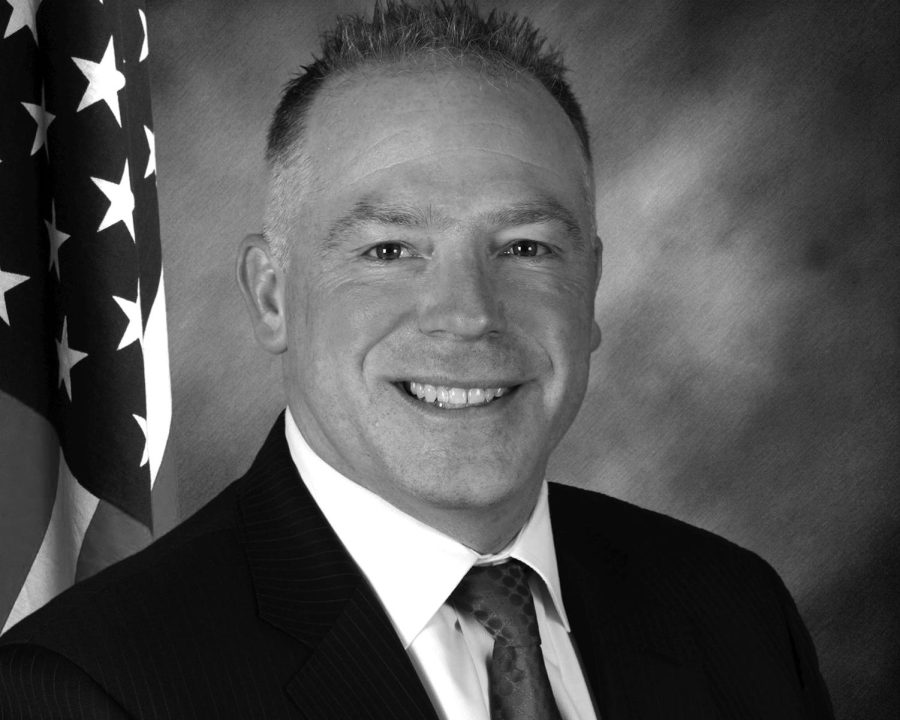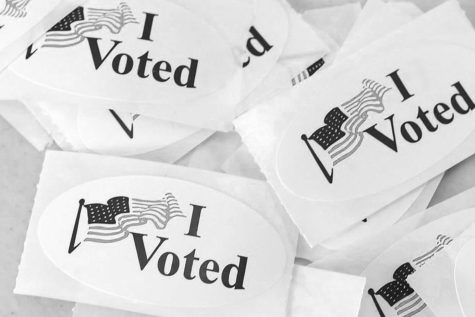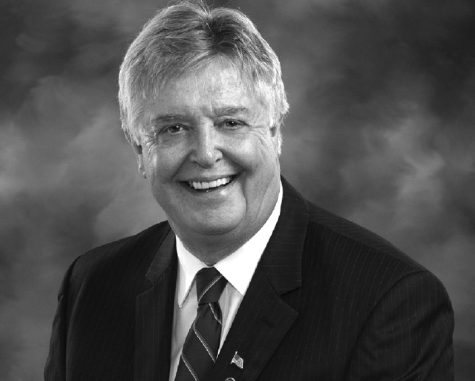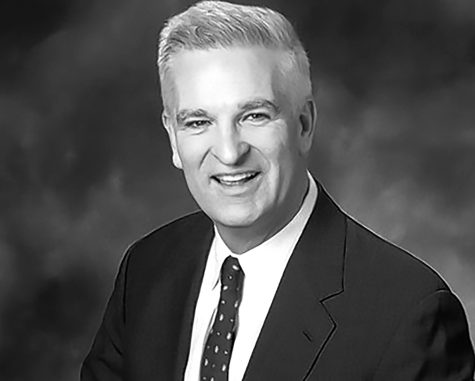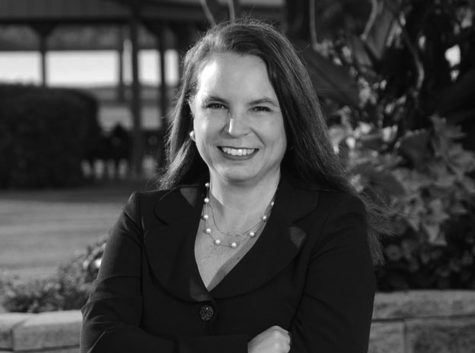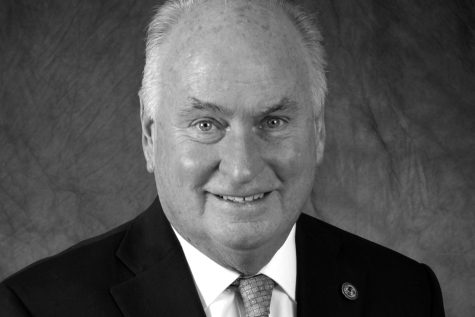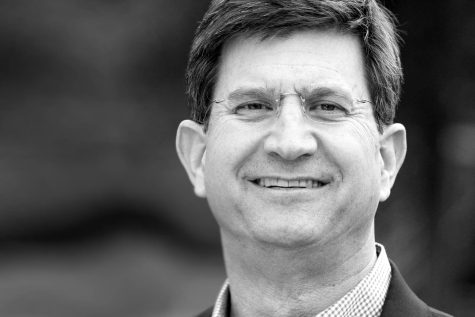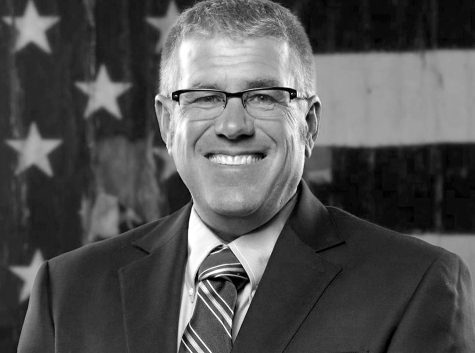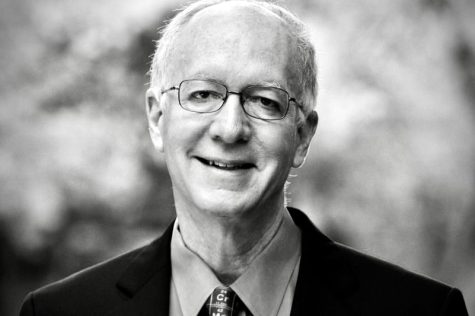Meet Craig Wilcox, the Republican candidate running for District 32’s State Senator
Republican candidate Craig Wilcox talks former President Trump, the Air Force and his his goals if he’s re-elected
Senator Wilcox
Craig Wilcox is Illinois district 32’s Republican State Senator running for reelection on Nov. 8. A veteran, Wilcox has served on a number of different congressional committees.
October 27, 2022
Craig Wilcox is District 32’s current Republican state senator. He is running for the midterm reelection on Nov. 8 against Allena Barbato, the Democratic party candidate.
We will post our interview with Barbato next week.
Can you tell me a bit about yourself?
Sure. So I lived in Vermont, and once I finished living there, I went to college and then joined the Air Force, and spent 24 years on active duty. And when I got out of the service, I moved to Illinois. I’d never been from Illinois, and after a couple of years decided I needed to get involved.
I really hadn’t been in politics at all in the local communities; I moved 17 times in 24 years. So, I thought about running for the school board, but at the time our son was going to Marian and our girls were going to St. John’s, and I kind of convinced myself that people wouldn’t want me on the school board. So I ran for the County Board in McHenry in 2016. And then, in 2018, Senator Althoff was retiring, and people liked what I did on the county board and asked me to consider running for the Senate. So, it wasn’t anything that I had planned, but kind of got talked into doing it to become a good representative of the constituents in the district.
When you say that people enjoyed the things you were bringing to the table, what were some of those things? What’s your platform about?
So it really wasn’t about the platform, it was about actually doing the work. So, I had read all the kinds of rules, I’ve read contracts with administrators, I was always prepared for the topics that were on the agenda, and would always speak as to why I was voting a certain way. And I think what people liked was the fact that I was doing the work that, arguably, should be done by everyone. So, it was about being prepared, understanding what the issues were, and actually explaining why my vote was going to go a certain way because of how it would impact the district at the time.
Speaking of doing all of this work to promote what you’re doing, what would you consider your proudest professional moment?
So I did combat communications in the Air Force, meaning I was AT&T, ComEd, and Comcast for the military. And our goal was to be prepared to do that whenever we needed a new air base somewhere. And, during the Iraq War, my group went in at the very beginning, and established an air base in Southern Iraq during the initial conflict. There’s no doubt the pride and training we’ve given our Airmen and their ability to do that job under those conditions is probably the most proud accomplishment from that perspective.
Do you feel that your Armed Forces experience helped with preparing you for work in office?
Absolutely, and I think I realized that a lot more when I came out of the military. Things that we fight for; equality, colorblindness, training people to be their best, and having leadership qualities absolutely were all fostered in the military, and have a great benefit as an elected official, because we’re responsible for being able to educate our constituents and understand their issues. And then when we take votes, it’s not my view that matters; it’s what I know about the district, and vote for what the district prefers.
What are your thoughts then on government spending and taxation?
I have always been kind of a more limited government, and certainly limited spending, because I committed my time in the Department of Defense and now, being an elected official, sometimes government isn’t the best suited because of bureaucracy [which can] do things the most effective and most efficient way.
Individuals in our country collectively are much smarter than the government. And so giving people the freedom to make change in their environment, and do what they want to do, is always best for me. But bureaucracy has two aspects. One, it keeps government from doing bad things quickly. The challenge is sometimes it also keeps the government from doing good things quickly, just because of the bureaucracy. But as far as spending and taxation goes, dollars in constituent’s pockets are spent based on their desires, their needs, whereas dollars in the government’s aspects are never truly spent on behalf of everyone. They usually have a certain focus and that’s a challenge.
Right, so you focus more on the community’s dollars?
Yeah, in that sense. So rather than one dollar going to the government, and then being spent on a certain program but only affects a few people, dollars in people’s pockets allows them to spend it based on their family conditions and their view of what their needs and desires are. But that doesn’t preclude that the government does have certain responsibilities, right? To collective defense of the nation, taking care of beings who have unique challenges and then providing for safety.
What are your thoughts on Roe v. Wade being overturned?
So when Roe v. Wade was approved more than a half century ago, the goal was to make abortions legal, safe and rare over the course of 50 years — certainly not considered to be rare at this point. For Illinois, Illinois has codified so much in regards to the issue in the statute. The federal decision in essence returned it to the states and Illinois is a very strong supporter of abortion rates. So it really didn’t change anything in Illinois.
What are your thoughts on the SAFE-T Act that’s currently being proposed here? Do you have certain plans to support whatever stance you have?
Sure. So, in fact, your timing is correct, because tonight [October 20] I actually have a town hall to discuss the SAFE-T Act with constituents.
The proponents of the law really have two sides they wanted to see. One, people shouldn’t be held in jail for lack of bond if they’re low level offenders and not a threat. And then on the other extreme, for violent offenders, they didn’t want the ability to bond out to be the differentiator. Unfortunately, the way they wrote the law really doesn’t accomplish that.
So for the SAFE-T Act, my number one aspect is, given the short time and veto session, that either the act be repealed or significantly changed. The challenges [are that] the SAFE-T Act never had legislative debate and didn’t go through committee hearings, and that’s usually where these types of challenges come out. As you’ve seen now, more than 50 states attorneys and most law enforcement have sued to have the law overturned, because the language is confusing. It contradicts itself at times, but the overall intent probably has bipartisan support. So I’m hopeful that in veto session, we will address many of those issues where the law as written, did get to the intent of the sponsors.
Unfortunately, the law is kind of vague. This is allowing multiple different interpretations, and that’s not usually good legislation. If you’re going to pass something, you want it to be relatively clear on how it should be enacted. Otherwise, we’ll end up with 102 different avenues of enacting it across the state potentially. And that 102 is for the 102 counties that are in the state.
I’m currently looking at all of the committees on your website. Are these committees that you run?
No, so there are only two that I’m the minority spokesperson for. So if you see the committees and there’s a parenthese (MS) behind it, that means I’m the Republican lead for those, and that’s the Veterans Affairs and Local Governments. All of the other committees I’m a member of, but ultimately the majority party controls those committees on what will come and hearings.
A lot of the chairmen, pretty much all of them, of the committees are democratic. How do you work together to see past these labels and progress Illinois?
I’m kind of lucky. In two committees, being the minority spokesperson on Veterans Affairs and Local Government, you develop a good working relationship with the chair. Ideally that should exist on all of the committees — that there’s a good working relationship between the majority party and the minority party. Then many bills that do come out of committees usually are unanimous votes to go to the floor. And then there is the chance that, you know, if there’s disagreement, the goal is to at least offer valid concerns as to why the legislation should change. And oftentimes that does happen after committee debates.
Do you have any plans right now to help with making FAFSA more valuable to families in Illinois who deal with inflation but with little pay increase?
So because that is a federal program, in the General Assembly for Illinois we don’t address it directly. But, we do FAFSA webinars routinely throughout the year to help families who may be confused by it or to at least understand what the process is. So we’re always doing constituent education, whether it’s FAFSA, Medicare, or talking about the bills that are coming forward in the legislature.
Do you have any access to using your influence to let the federal government know that there are things that can be changed with [FAFSA]?
Sure. So we have two options, one for the General Assembly in Illinois, we can always pass resolutions recommending certain changes to our federal statutes. And then two, I have a local Congressperson, who is Congresswoman Underwood right now. We have two US senators, Senator Duckworth and Senator Durbin. So as a legislature, I can always let them know from this portion of their district, here are some concerns that might be beneficial for a federal statute change.
Have you ever used any of those two options to suggest things the federal government needs to take care of?
We’ve worked with Congresswoman Underwood, often in regards to federal transportation dollars. There have been many grants to municipalities that are in districts that overlap the congressional and my Senate district. And we’ve actually together been at some events, announcing federal dollars for those municipalities for different activities. The Zoom that we have up was actually a veteran’s bill that we passed last year and we’re doing trailer language, and some of the language in this school will also be recommended for potential federal changes.
If you have a say in it, how would you help Illinoisans stay in state for college when it’s a lot cheaper to go out of state somewhere around Illinois?
We just had a higher education discussion last week. Wisconsin has a single state university program so everything is University of Wisconsin at wherever the site is, and it allows them to specialize. Whereas in Illinois, we have 12 different types of state universities and often they have duplicative programs. Like, if you’re gonna go to engineering, you probably go to U of I. But there are still engineering programs at the other state universities, and what we find is very sought after teachers sometimes are teaching smaller class sizes than if students from the other state universities were in attendance at one place. So a potential look there has the potential to reduce tuition fees. The other one, there are some states that have a mandate that its state university’s X percentage of students need to come from within the state. Illinois does not have that currently.
With all of the things that Trump has done for the United States, and he had wanted to rerun, do you think that he should have ran again?
So President Trump? Well, he did run the second time, right? And I don’t know if the impeachment dictated the outcome of the election. I think policy-wise, America was a little bit better under President Trump, but his ego definitely didn’t produce the presidential aura that American residents would prefer, and I think that’s what drove the change.
So when I supported Air Force One, President Obama was the president. And I could actually admire him for his persona in [as] president, even if I disagreed with many policies. So I think that was the dichotomy between President Obama and President Trump. I may have preferred the policies a bit more, but personality wise, you have a view of what the President should be. And I think that’s what cost President Trump his re-election.
What would be some of Trump’s policies that you think were beneficial for the United States?
Well, today with gas prices the way they are, it was the energy independence that America obtained under President Trump, that when President Biden came in, immediately started overturning a lot of that for the energy community. Certainly the war in Ukraine and the Russian involvement has exacerbated the fuel cost, but many of the policies were more advantageous to families. And we had inflation under 2% For a long time under multiple presidents. And that’s been a challenge for the last two years.



